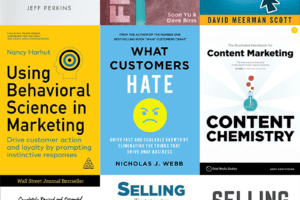Sean Griffey is the co-founder and CEO of Industry Dive, a digital media company that publishes news and analysis for millions of business execs across 22 verticals. On this episode of Yes, and Marketing, he and Steve go in depth on marketing, media, and metrics:
- How Industry Dive measures quality in their content
- What marketers can learn from media companies
- His contrarian view on precision marketing
- Advice for mergers
- His top lesson from a former career in consulting
Listen to the full conversation above or read on for highlights from the interview. You can also check out clips from all our recent episodes at our podcast page.
Guest-at-a-Glance
???? Name: Sean Griffey
???? What he does: Co-founder and CEO of Industry Dive.
????️ Find Sean on the web: Industry Dive | LinkedIn | Twitter
???? Get smart: “You can put a lot of metrics around content that can get in the way of actually great content.”
Top Takeaway
How Industry Dive thinks about quality ????
“I don’t care if I get a million people reading our utility publication—and in fact, there’s not a million North American utility execs, so if we had a million visitors to the site every week, we’d be doing something wrong,” Sean says.
Quality content for him doesn’t mean viral numbers. Industry Dive is intended to serve niche business audiences, which mean there’s an upper limit on how many eyeballs their publications should reach. Instead, they look at what their audience does with that content.
For example, “We know we have a good story when we see an email passed around an organization,” he explains. “This person opens it once a day or twice a day, and then all of a sudden this person’s email got opened 74 times.”
That kind of sharing means something in the content truly resonated with their audience.
For Sean, that’s their indicator of quality content: “Someone cared enough to put this not on a blog or on Twitter, but within a trusted network.”
Episode Highlights
Read verbatim excerpts from the interview.
The difference between regular journalism and business journalism
“We have a grocery publication that covers the grocery industry. When Amazon bought Whole Foods, that was a one- or two-day story for the mainstream media. Even big business publications like the Wall Street Journal, they covered it, and then they moved on to what’s next.
For business journalism, we talked about that for weeks and months, and we’re still talking about it. What does it mean? What’s changing? How is the pricing strategy?
It’s a level of depth that you can’t get in the mainstream, that you can get in niche, business journalism.”
Why AI isn’t displacing humans in content
“I’m a believer in great content. I’m a believer that humans can provide insight that AI can’t be trained to do. And so I’m actually the contrarian that says, I think the real trend is that the value of content is only increasing right now, and the value of storytelling as a differentiator is even more important than it was six years ago.”
What content marketers should learn from media companies
“You have to think of content marketing as audience building, which is what media companies do really well. And one of the things that matters for media is a regular cadence and a predictability. It doesn’t necessarily have to be daily, but you can’t do it in bursts, like ‘I’m going to do five things in one month and nothing for three more months and then do a couple things.’
You’ve gotta be regular, if you really want to reach an audience, build an audience, become part of their habits and have them view you as part of their community.”
The blessing and curse of bootstrapping
“Being bootstrapped, I think the blessing is it forces a good amount of discipline. The curse is that there’s always something that you really want to do, want to tackle, that you just can’t get to.”
Advice for M&A
“Culture really matters. How do you envision the teams will interact? Would you have built the team that you’re acquiring, or would you have done something different? Do they have an entirely different DNA and culture that’s going to clash with yours? If they do, I think you have to really think twice about it.”
One lesson from consulting
“Everyone values someone that helps solve their problems. Before I was a CEO, it was, ‘How do I solve my boss’s problems,’ right? ‘The most valuable thing I can do is solve my boss’s problems.’
The most valuable thing any of us can do is solve our client’s problems. It’s not just ‘Do a job’ or anything else; it really is, Solve their problems.’”
Why precision marketing has gone too far
“We’ve swung a little bit too far to, ‘Hey, I only want this job title at this company, and I don’t care if the four other people at that company this person talks to every day sees my ad or knows anything about me.’ We’ve lost the thread that humans consult with each other to make decisions, and they want validation of the rest.
Marketers need to think about more than just this pinpoint precision, ‘I’m going to go to Facebook and only look for this person.’ It’s just not the right way.
Top Quotes
????️ Sean:
“If you want to be a great writer, you have to write every day.”
“You can put a lot of metrics around content that can get in the way of actually great content.”
“The most valuable thing any of us can do is solve our client’s problems.”
“There are two types of marketers: There’s the ones who are the creatives that want to create ads, and then there’s the ones that love the spreadsheets and are in the data all day.”
“Be open to experiences. Don’t be afraid to look to new places to learn.”
Learn More
Sean and Steve talked about legendary blues musician Robert Johnson and the devilish myth behind his talent.



